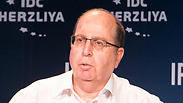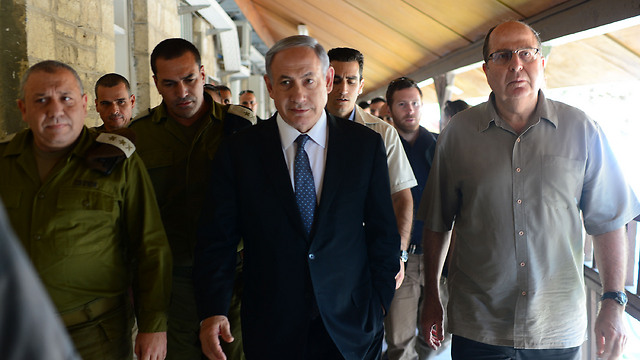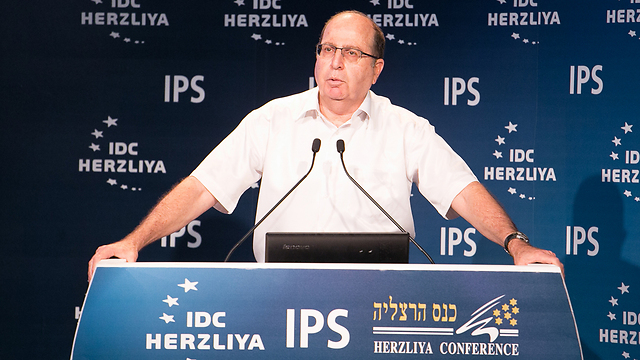
Ya'alon: US supply of advanced arms to Gulf can challenge Israel
At Herzliya Conference, defense minister voices concern over Gulf armament against Iran, offers one the bleakest assessments on talks with the Palestinians: 'There'll be no peace agreement in my lifetime'.
Defense Minister Moshe Ya'alon voiced concern on Tuesday that Washington's supply of advanced arms to Gulf Arab states to deter Iran could eventually challenge Israel's US-backed regional military supremacy.
"Even if there are not now any hostile designs (among them) against us, as we know in the Middle East intentions are liable to change. The capability will without a doubt be there and this must be prepared for," he said.
Setting the stage for talks later in the day with General Martin Dempsey, the head of the US armed forces, Ya'alon spoke at a security conference of a need to maintain Israel's "qualitative edge" as it seeks increased defense grants from Washington.
"The Gulf states are arming themselves, mainly with Western, American weaponry, in the understanding they will need defensive capabilities to contend with the new Iran situation," Ya'alon said, referring to international talks on curbing Tehran's nuclear program in exchange for sanctions relief.
"This of course challenges us, too, and here there is enormous importance to preserving what is called the State of Israel's 'qualitative edge' in the face of this regional arms race," he said at the annual Herzliya strategic conference near Tel Aviv.
Washington uses "qualitative edge" as the rubric for ensuring Israel gets better US-produced weaponry than its potential adversaries.
Israel sees the proposed Iranian nuclear deal as insufficient to deny Iran the means of making a bomb. It says that relief from sanctions would allow it to give more funds to Shi'ite allies battling Sunni Arabs in various parts of the region. Iran says its nuclear program is peaceful.
But Gulf Arab leaders share Israel's concern and US President Obama pledged on May 14 that in the event of a threat to them, the United States would consider using military force for their defence.
Many Gulf states already have sophisticated US weapons in their arsenals are along with Washington are looking into the possibility of upgrading their missile defense, cybersecurity and counter-terrorism capabilities.
'Peace with Palestinians - not in my lifetime'
Discussing the Israeli-Palestinian conflict, Ya'alon accused the Palestinians of having "slammed the door" on efforts to keep discussions going, and said they had rejected peace-for-land deals for at least 15 years.
Peace negotiations broke off in April 2014, with disputes raging over Israeli settlement building in the West Bank and Palestinian President Mahmoud Abbas's unity deal with Hamas Islamists who rule Gaza and do not recognize Israel's right to exist.
"As for the possibility of reaching an agreement, there is someone who says he doesn't see one during his term," Ya'alon said, referring to remarks US President Barack Obama made in an Israeli television interview last week.
"I don't see a stable agreement during my lifetime, and I intend to live a bit longer," Ya'alon told the Conference goers.

Palestine Liberation Organization official Wasel Abu Youssef told Reuters past and present Israeli governments had "closed the political horizon" by demanding to retain major settlement blocs and rejecting a right of return for Palestinian refugees.
Youssef said Netanyahu's administration bore responsibility for the current impasse because of its settlement activities, refusal to release jailed Palestinians, and demand that Palestinians recognize Israel as the nation-state of the Jewish people.
On the eve of his March 17 election to a fourth term, Netanyahu drew international criticism by saying there would be no Palestinian state if he remained Israel's leader.
He said withdrawal from occupied territory by Israel would embolden hard-line Islamist guerrillas arrayed on its borders.
Netanyahu has since sought to backtrack, insisting he remained committed to a "two-state solution" in which Palestinians would establish a demilitarized country and recognize Israel as the Jewish homeland.
Netanyahu was due to address the forum later in the day.











